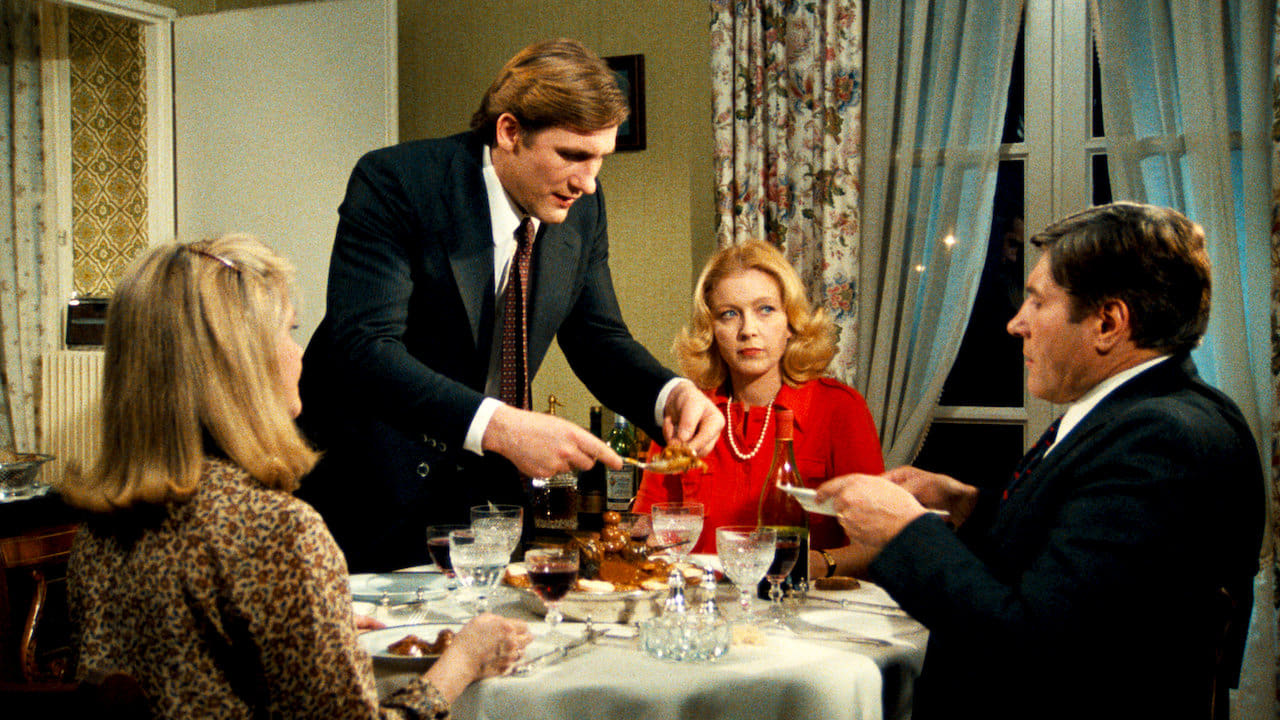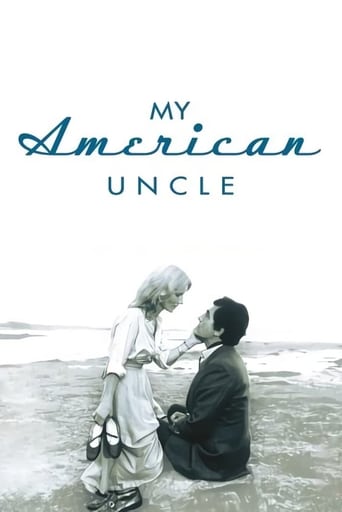


It's Difficult NOT To Enjoy This Movie
... View MoreThis movie was so-so. It had it's moments, but wasn't the greatest.
... View MoreBlistering performances.
... View MoreA great movie, one of the best of this year. There was a bit of confusion at one point in the plot, but nothing serious.
... View MoreCinema is typically an emotional realm, so using it to present intellectual thesis poses quite the challenge. Firstly, you are at risk of not presenting the thesis carefully enough, which typically requires chapters of careful wording. Secondly, you risk dulling the action with exposition. Thirdly, you risk being preachy. And lastly, all of the above is exacerbated if the audience disagrees with your thesis. "My American Uncle" cannot perfectly avoid all these pitfalls - it comes with the territory - but it is a rare film where both science and poetry appear in harmony, without detracting, and even aiding, the story.From child to adult we follow the lives of three characters, born with naught to do with each other, becoming entwined in the most dramatic circumstances. Rene, a farmer turned textile executive. Janine, an aspiring actress who turns to textiles. And Jean, a bourgeois politician, who has an affair with Jean. In common they all aspire to greater success, higher status, and more joy in life, at the cost of their family relationships and health. Intercut and narrated over the plot is a psychological analysis of human behaviour, and how we unconsciously seek to gain control and power by (often unwittingly) dominating others. Our reactions to challenging situations are compared to rats in a cage when subjected to scientific experiments involving electric pulses. This exposition breaks the fourth wall, analysing the action as it plays out, yet manages to creep in and out just so that we are still swept up in the story, and the further it goes, the more emotional resonance it carries.If I were to offer one critique on the psychology, is that it never allows us to transcend our pain. In other words, it never explores the idea that mental stability or peace can be achieved without dominance, or in fact, for not everyone can be dominant, that it is absolutely necessary to do so. However if that message is not stated explicitly, it may be implied, given the calamitous climax.
... View MoreThis movie contains three elements: a neurological/psychological lecture, a melodrama of three intersecting lives, and scenes from black and white French movies. Presumably, these elements are supposed to add up to an artistic unity, but they work against each other instead, so that the net result is irritating. Especially confusing is the way the backgrounds of the three major characters are presented like someone hurriedly reading their dossiers.If the entire film were simply a discussion on neurology and psychology, it might have been interesting. If it were just a melodrama, it might have been enjoyable. But the combination of the two creates the feeling that we are being talked down to. Over and over we are told that our conscious mind thinks it has reasons for what it does, but we are duped by our unconscious. No doubt, that is sometimes the case. But intercut with the melodrama, this lecture condescendingly suggests that we would not be able to understand these people and what they do without the benefit of the lecture.References to American uncles are reminders that we live lives of illusion, since people express doubts about these uncles. The gratuitous scenes from old movies presumably are supposed to reinforce this notion of the illusory conscious mind.The movie as a whole is less than the sum of its parts.
... View MoreI have just seen the film in my city's biggest cine club with just about all my cinema colleagues. When I bought the ticket I was handled a leaflet with comments of some critics and the very first sentence was "it questions what it is to be French" which obviously scared me. Although I much love the European country and do like many of its films, this is not a question I catch myself asking every now and then. It seemed like a Nouvelle Vague personal crisis of what am I, where I am at, and all that... and I have to say my opinion about the Nouvelle Vague is quite controversial to most of the cinema fans. When the film began, the explanation of the thesis the movies shows most willingness to prove, I all had was a confirmation and a damn-it-what-the-hell-am-I-doing-here sensation. However, I've payed for the ticket, I had slept for the whole afternoon and I didn't have money for extra beers outside the cinema, so I stubbornly decided to stay. And what a wise decision I have made! The plot goes on beautifully questioning everything (and I couldn't spot the French questions, thanks God). I actually saw questions about love and life - definitely not exclusive to the French. I saw characters that were designed with a precise care - not excessively harsh, nor excessively romantic. Real people with real problems and real solutions (for the good or for the bad). In a sensitive and reasonable balance, not in the hysterical way many movies end up going whilst pondering about such questions. I have to say I thought a zillion times on the last part of the movie that this was the time to stop, to finish. And the director kept on repeating scenes and talking about all his personal theories - which I think the viewer has the legitimate right to formulate. But it kept on going and kept on going like a brainwash. I, myself, and what I think is my intelligence, got a little offended. In the overall, I really enjoyed the film. And I am going to watch some other Resnais' work to see if his cutting skills had developed, don't worry.
... View MoreThis film was made with the cooperation of psychologist Henri Laborit. It's broken down, like a greek drama, into narrative episodes and odes where the chorus, in this case psychologist Laborit, explains the meaning of the episodes. I love this movie because it makes clear the pretenance to everyday life of a discourse which is very rich as an interpretation of life, in exactly Matthew Arnold's sense, but at the same time so abstract that most people just, for example, reading Laborit's "Decoding the human message" would not see the immediate relevance of what was being said to their own daily concerns. I use this film to teach psychology. I open my intro class with it every term. Learning to read this film is learning to think like a psychologist. In the film, we cut from scenes of the human characters involved in various relationships to Laborit showing how lab rats react to stress under various conditions. The result is not dry or pedantic but funny as hell. It comes off as the rats doing a low burlesque of the human comedy. We also see the characters as children and as adults and scenes from various formative episodes along the way. When Laborit says "a person is a memory which acts" it seems a powerful commentary on what we are seeing on screen. We see one character as a tiny girl interacting with her factory worker father. He is a communist and he is teaching his newly articualte baby girl to repeat after him "USA go home". Watching this, I remember being taught to sing "Jeusus loves me" shortly after I started talking. This film is funny and wonderful dealing with the thing which matters most of all, the question of what it means to be a person.
... View More